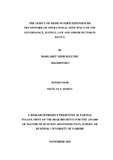| dc.description.abstract | The Medium Term Expenditure Framework (MTEF) was introduced in Kenya in
1998 and it was first implemented in the budget in the financial year 2001/2002 after
the failure of the Forward Budget Review Program, the Budget Rationalization
Program and the Public Investments Program , The main aims of the Program were to
increase fiscal discipline, Political accountability and public participation in financial
matters and improve efficiency of government operations through the introduction of
Budget Ceilings, Sector Working Groups and frequent Expenditure Reviews (PER,
2010). This study sought to investigate the relationship between medium term
expenditure framework and operational efficiency in the Governance, Justice, Law
and Order Sector (GJLOS). The specific objectives of the study were to establish the
relationship between MTEF and budget balance in the GJLOS, MTEF stakeholder
participation and fiscal discipline in the GJLOS, MTEF flexibility and allocative
efficiency in the GJLOS and MTEF program focus and technical efficiency GJLOS.
The study utilized a descriptive survey approach in collecting data from the
respondents. The target population consisted of all the sectors of the Governance,
Justice, Law and Order Sector (GJLOS). Data collected was both primary and
secondary data. Data was analyzed by the use of descriptive statistics using SPSS and
presented through percentages, means, standard deviations and frequencies. Further
the data was regressed to obtain t - values , p-values , specific coefficients and
intercepts, standard errors among other values at given significance levels. The study
found that MTEF allows the linkage of budget planning decisions in the light of
emerging needs and also based on the available resources. It also found that MTEF
provide a platform where various stakeholders are involved in presenting their
decisions over what they consider is appropriate. The study concluded that MTEF
ensures flexibility of expenditure and that it is linked to the revenue projections
thereby minimizing budget deficit. The study recommended that MTEF be broken
down to specific, achievable and measurable targets, which can be used to directly
assess its impact on Government operations and also to discourage the mentality that
keeps the budgeting process sinking back to incrementalism. | en_US |

